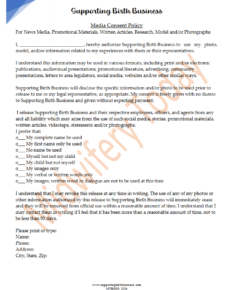
Photo by leah hetteberg
Healing Birth
Midwifery Today, Issue 147, Autumn 2023.
Join Midwifery Today Online Membership
“Hey, sir, can you help me with my birth bag? This one here. I’ve got to deliver a baby. Yes, down these steps. Thank you so much.” I beseech a guy who is walking down the street as I drop my Volvo in front of my client’s home, after speeding the wrong way down her one-way street.
I wobble in, the weight of my grey birth bag nearly toppling me over as I get down the steps. The good Samaritan is trudging dutifully behind me. I never call it “delivering a baby,” but I needed to, this one urgent time.
I recalibrate from NYC traffic-driven adrenaline to a peaceful pace for an undisturbed labor. I arrive, awaiting the wild, divine moment that greets brand new life. She is still proudly pregnant. Phew. I haven’t missed the birth. Some days I wish I owned a helicopter.
A contraction overcomes her. I press on her back. Strong, steady, lower back massage. Her body melts in relief. I know where to touch. I don’t need words. I dim the lights and whisper, “You’re doing so well. Just listen to your body. You know just what to do.” We lock eyes, the enormity of her experience absorbed between us.
I state the physiologic fact: “Your baby knows just what to do. You’re getting closer. You’re nearing the end.” I don’t need to check how dilated she is to know that.
I support her body during each wave. The undiluted strength of her body’s forces are pressed against my own. I feel this baby coming. I witness her deep, rhythmic breathing, the universal response to normal, un-numbed birth. Gital goes inward even between surges. The labor is drawing on every resource that she has. Her mammalian brain is leading. I keep silent, lest I interrupt her raging, wise instincts. She rocks, partially squatting, and moans.
I won’t put my fingers inside of Gital’s sacred body. The stretched piece of cervical membrane cannot quantify an immeasurable human experience. A mother is about to be born. And I sense it, intuitively, as a midwife.
I crouch to auscultate the baby’s heartbeat. Gital leans forward, her eyes shut, braving each surge as the birthquake erupts in her.
The fetal heart rate is robust. Eager. In alignment with its mother. The song of this emerging life penetrates Gital’s consciousness. Her inner trauma terrain from Ben’s hospital birth four years ago is surpassed. Gital has broken free of victimhood and has embraced self-sovereignty. She has abandoned protocolized medicine and hierarchy. Her baby and body are too precious for birth politics. This pregnancy has been a journey to Gital’s essence. And we are reaping its reward.
“Where would you like to have the baby? Do you want to birth in the bathroom? Bedroom?”
My sister midwife has arrived. We quietly unpack our emergency gear that is unlikely to be needed. But we’re set up.
Our client prefers to labor on the toilet. The gravity is productive.
“Every contraction brings you closer to the baby.”
“You’re healthy and safe.”
She is laboring and sweating and shifting positions frequently. Fanning Gital doesn’t relieve her. She’s overheating from the arduous bodily work. The moaning is progressively more guttural. A baby is crawling out. We’re gloving up. I glimpse a sliver of dark-haired head descending.
The doula, Deb, is in front helping to steady Gital as she squats on all fours. We are kneeling beside her. Deb birthed her daughter with us two years ago at home. The oxytocin reignites and surges through our collective blood. I witness one homebirther selflessly safeguarding her sister homebirther. Deb exhales raw courage. Gital inhales it through every pore of her sweating body.
Both of them had become mothers in a hospital before being awakened to homebirth. They were breaking old patterns and forging a new way. The enormity of it all is penetrating me: This is the sunset of an era. We are abandoning the intergenerational birth trauma that we’ve inherited down our maternal lineage. Heart in heart, we hover on the brink of the universe about to release another one. This is birth. This is feminine superpower. Women who believe in women showing up for each other.
We are three rebellious sisters, with the aura of feminists who are doing soulwork. We are helping Gital birth in a way that displays her strength. We haven’t succumbed to the media-regurgitated birth narrative. We weren’t shepherded to the paradise of medical technocracy. We wouldn’t meddle with G-d’s design. Why would we undermine the inherent wisdom of our own female bodies?
We are women keepers. Nothing will entice us to forfeit a fundamental feminine experience.
In that dim bedroom, counterculturally, we trust birth! Instinctively, we trust Gital. Rightfully, we fear the hospital. Most maternal deaths in New York involve a c-section. Not vaginal birth. And certainly not homebirth.
More dark-haired head is visible. The perineum bulges. The pushing is involuntary. The scar from Gital’s last birth is thinning. My right hand is on the right side of her perineum, my left hand on the left. I’m physically holding the scar together, using a sterile gauze saturated in olive oil to get a better grip and create more perineal slack. A strong surge and more head bulges. “Breathe it out. Breathe. And breathe,” I whisper. The wave passes. The pressure on the perineum is reduced.
“You’re intact,” I reassure Gital. My sister midwife keeps the head well flexed so that the narrower diameter of the head will be born first and entirely, before the wider diameter emerges. She’s also counterpressures the perineal scar. The surges are relentless. The white scar gets whiter.
“Small cough,” we guide her. The gentle, downward pressure releases more head slowly. Half the head is out now. A thinned, stretched, intact perineum mercifully expands around it. I motion to our birth assistant to pour more oil. We’re still holding the perineum; I can palpate the contraction as the head presses against my unwavering hand. Gital is bearing down. The fetal ejection reflex has overtaken. I encourage her to push between contractions and breathe during the contraction. The expulsive force is blunted; her body is stretching gradually. More oil.
The baby’s head looks like it’s been dunked in salad dressing. My back hurts. I switch hand positions with my sister midwife.
We won’t let her tear. She had 13 months of postpartum pain when her last birth recklessly ripped her open. The vulnerable membrane is thinning more. Most of the head is out. The baby’s heart rate is perfect. We’re patient. There’s a puddle of olive oil on the saturated chuck pad. The forehead emerges. I see nose, now a mouth. The head is out. She’s intact.
I sweep my hand around the head. Four baby fingers grasp me. “It’s a compound,” I whisper to my sister midwife, who skillfully holds the baby’s hand against the baby’s head tightly, lest it move and tear its mother.
“One minute has passed,” our birth assistant whispers in my ear. She is keeping time as the head dangles out and restitutes. We wait for the next contraction to deliver the shoulders. It’s an effective way to prevent shoulder dystocia.
We continue to protect the perineum as the shoulders are born. The rest of the newborn body slips out. A vigorous baby is born. None of us dares to talk. We are basking in the magic cast by a brand-new life.
Gital is collects herself. We honor the birth pause. I place the slippery baby on her mother’s naked back and hold her there. Skin-to-skin they’re reunited. There’s a shrill newborn cry and the stirring tenderness of noble motherhood.
We wait.
Gital integrates that her body has been emptied of the pregnancy. She longingly looks up now. That’s my cue that she wants the baby. Instantly, we slide the perfect girl between her mother’s legs. Gital’s baby is placed rightfully into her beckoning, shaky arms.
I cry silently alongside the two of them. Of relief. Of birth’s power for radical self-love. I cry from the g-dliness that has embodied us. And of the g-dliness that is departing because the birth is now complete.
We stand back in awe. We don’t interrupt their moment. Motherbaby are in the golden haze of wonder and discovery. We revel in triumph at their victorious journey. They’re falling in love. The hormonal milieu of pristine birth is unapologetically primal.
The next day a tray of organic sliced honeydew and a note from Gital is at my front door. I read and reread the letter. I’m reminded how birth is the most critical life event. The human capacity to heal, to birth itself anew, is hanging in the balance during those infinite moments. I tuck the letter away.
This birth was an act of liberation and I was lucky to be at the epicenter of its miraculous transformation.





















